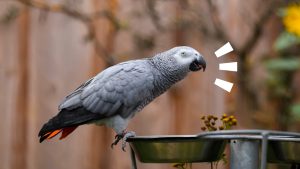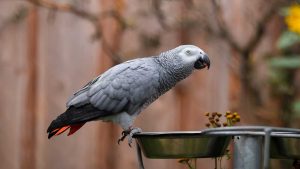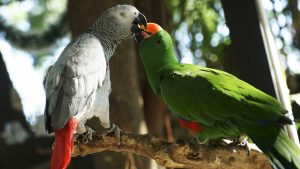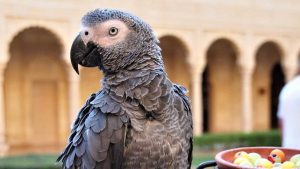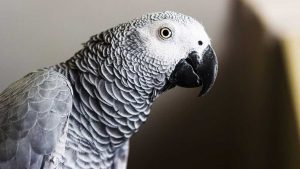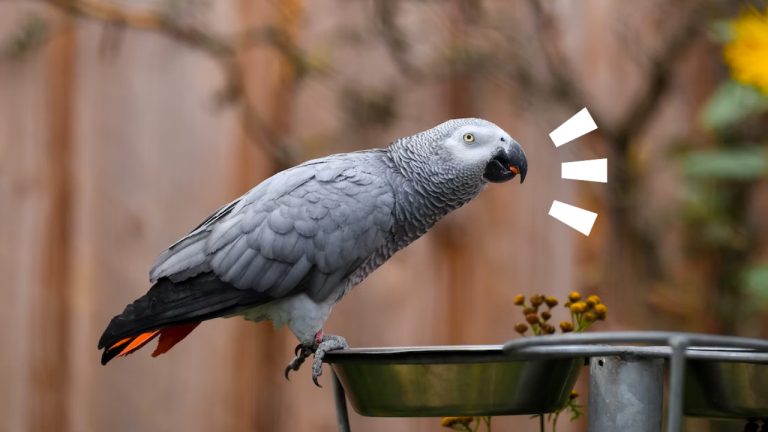Why Has My African Grey Parrot Stopped Talking? Possible Reasons and Solutions
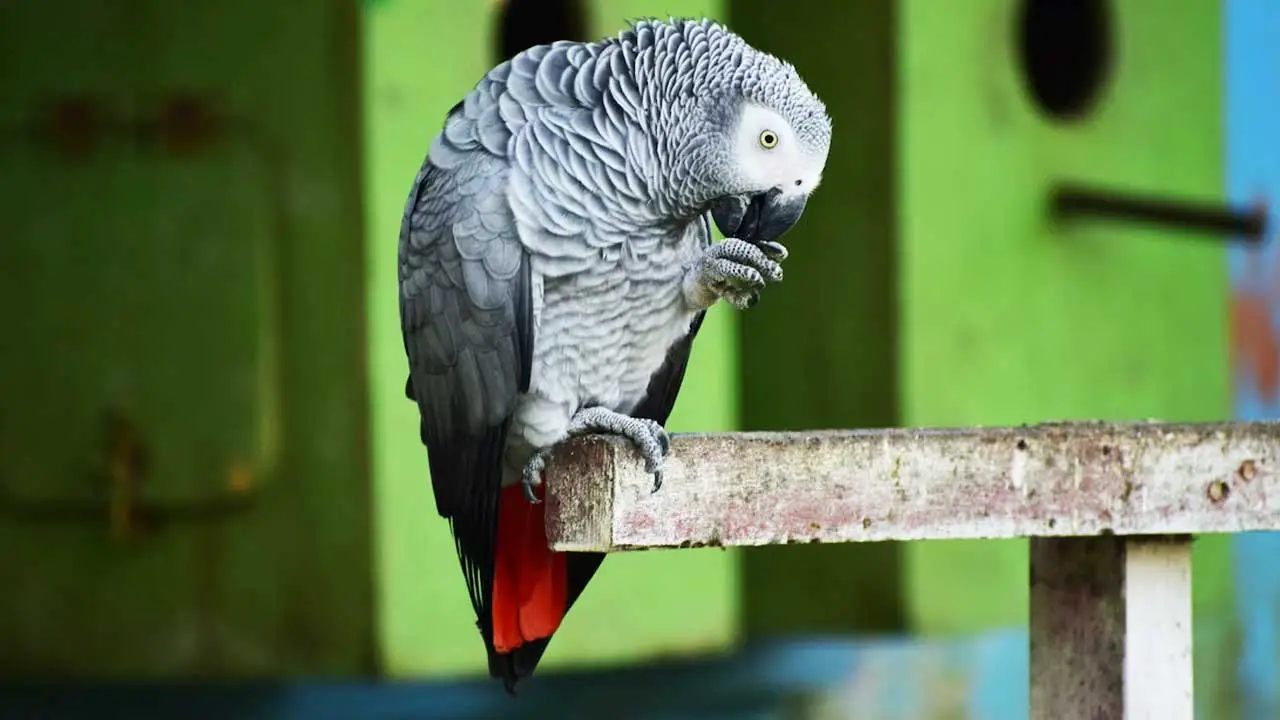
African Grey Parrots are known for their intelligence, sociability, and ability to mimic human speech. They are popular pets, but owners may become concerned if their parrot suddenly stops talking.
There are several reasons why an African Grey Parrot may stop talking, and it is important to identify the cause in order to address the issue.
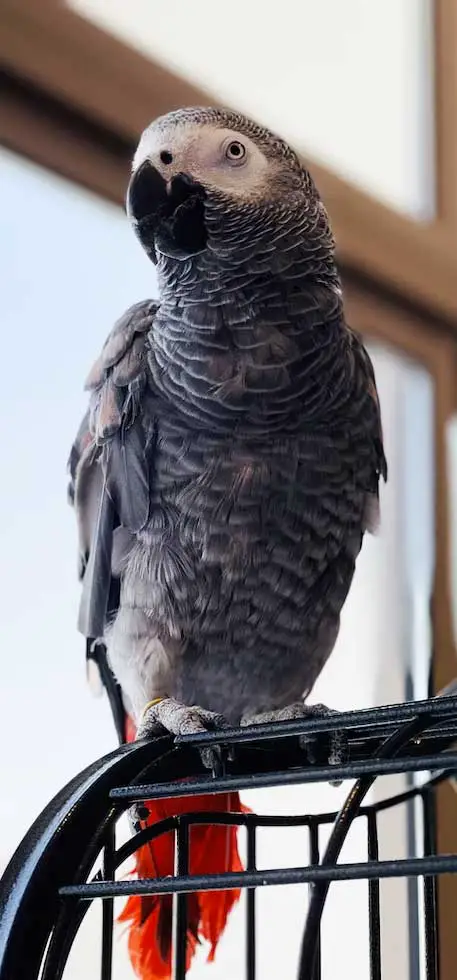
One reason a parrot may stop talking is that it is afraid or stressed.
Changes in the environment, such as moving to a new home or the introduction of a new pet, can cause stress and anxiety in a parrot.
This can lead to a loss of appetite, feather plucking, and a decrease in vocalization.
Another reason a parrot may stop talking is because of a health issue.
Aspergillosis and bronchitis can affect a parrot’s lungs, throat, or syrinx, making vocalization uncomfortable or impossible.
A parrot that has stopped talking may also be experiencing pain or discomfort from an injury or infection.
It is important to take a parrot to a veterinarian if it has stopped talking to rule out any underlying health issues.
Table of Contents
Possible Reasons Why Your African Grey Parrot Stopped Talking
Parrots are known for their ability to talk and mimic human sounds.
However, there may be times when your African Grey parrot stops talking.
This can be concerning for pet owners, but there are several possible reasons why this may occur.
In this section, we will explore some of the reasons why your African Grey parrot may have stopped talking.
Physical Health Issues
One of the most common reasons why a parrot may stop talking is due to physical health issues.
Parrots that have stopped talking may be unwell or depressed.
It is important to monitor your African Grey parrot’s behavior and look for any signs of illness or discomfort.
Aspergillosis and bronchitis are two conditions that can affect a parrot’s ability to vocalize.
These conditions can make vocalization uncomfortable or even impossible.
If you suspect that your African Grey parrot is experiencing physical health issues, it is important to seek veterinary care as soon as possible.
Environmental Factors
Another reason why your African Grey parrot may have stopped talking is due to environmental factors.
A parrot that is in a new environment or has experienced a change in its surroundings may be hesitant to talk.
Additionally, the presence of a predator or other stressful situations can also cause a parrot to stop talking.
It is important to create a comfortable and safe environment for your African Grey parrot.
Make sure that the cage is located in a quiet area of the home and that the parrot has access to plenty of toys and activities to keep it entertained.
Emotional Distress
Parrots are social animals and can experience emotional distress if they are not receiving enough attention or interaction from their owners.
A parrot that is suffering from mental trauma, such as separation anxiety, may stop talking.
Additionally, the introduction of a new family member or pet can also cause a parrot to stop talking while it adjusts to the change.
It is important to provide your African Grey parrot with plenty of attention and interaction.
Spend time playing with your parrot and providing it with toys and activities to keep it entertained.
Also, make sure that your parrot has a consistent routine and is not experiencing any sudden changes in its environment.
How to Help Your African Grey Parrot Regain Its Ability to Talk

If your African Grey parrot has stopped talking, there are several steps you can take to help it regain its ability to speak.
Here are some tips:
Consult a Veterinarian
Before taking any action, it is important to rule out any underlying health issues that may be causing your parrot to stop talking.
Take your bird to an avian veterinarian for a check-up to ensure that it is in good health.
The veterinarian may also be able to provide advice on how to encourage your parrot to start talking again.
Create a Calm and Stimulating Environment
African Grey parrots thrive in a calm and stimulating environment.
Make sure that your parrot’s cage is large enough for it to move around freely and that it has plenty of toys and perches to keep it entertained.
Play soft music or provide background noise to create a calming atmosphere.
Avoid loud noises and sudden movements that may startle your bird.
It is also important to provide your parrot with a healthy diet that includes fresh fruits and vegetables, as well as a source of protein.
A well-nourished bird is more likely to be healthy and happy, which can encourage it to start talking again.
Spend Quality Time with Your Parrot
African Grey parrots are social birds that crave interaction with their owners.
Spend time talking to your bird and engaging in activities together, such as playing games or teaching it new tricks.
Consistency is key, so make sure to set aside time each day to interact with your parrot.
When teaching your parrot to talk, be patient and consistent.
Repeat words and phrases regularly and reward your bird when it mimics your speech.
Avoid punishing your parrot for not talking, as this can cause stress and anxiety, which can further inhibit its ability to speak.
By creating a calm and stimulating environment, providing a healthy diet, and spending quality time with your parrot, you can help it regain its ability to talk and strengthen your bond with your feathered friend.
Training Techniques to Encourage Talking
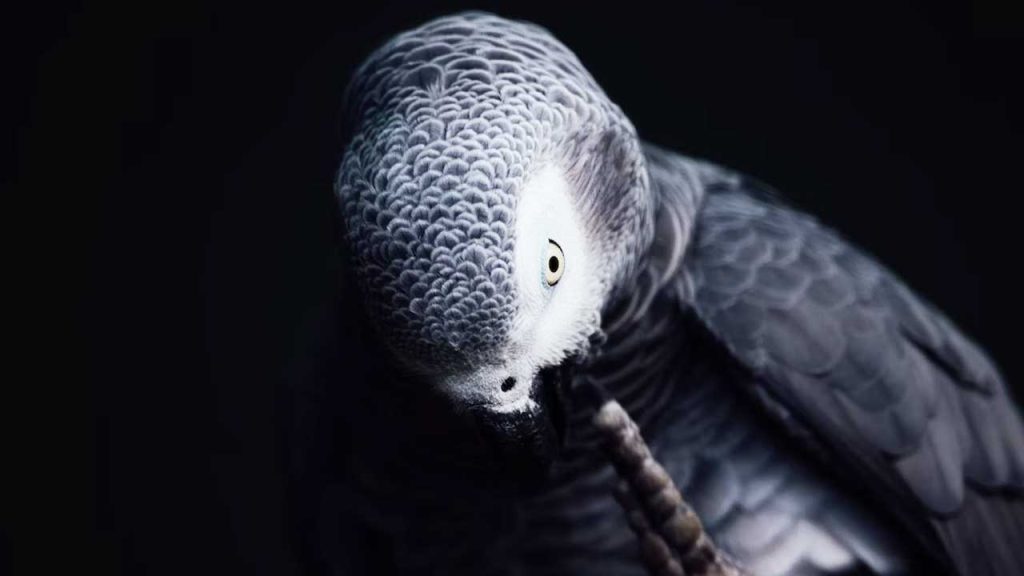
There are several training techniques that can be used to encourage an African grey parrot to talk.
These techniques include positive reinforcement, whistle training, and teaching new words and phrases.
Positive Reinforcement
Positive reinforcement is a technique that involves rewarding a behavior to increase the likelihood of it being repeated.
When training an African grey parrot to talk, positive reinforcement can be used to encourage the bird to mimic certain words and phrases.
One way to use positive reinforcement is to reward the parrot with a treat or praise every time it repeats a word or phrase correctly.
This will encourage the bird to continue mimicking the words in order to receive the reward.
It is important to be consistent with the rewards and to only reward the bird when it repeats the word or phrase correctly.
Over time, the parrot will begin to associate the words with the reward and will be more likely to repeat them.
Whistle Training
Whistle training is another technique that can be used to encourage an African grey parrot to talk.
This technique involves teaching the bird to whistle certain tunes or melodies.
To begin whistle training, choose a simple tune or melody and whistle it to the parrot several times a day.
Eventually, the bird will begin to associate the tune with the sound of the whistle and will attempt to mimic it.
As with positive reinforcement, it is important to be consistent with the whistle training and to reward the bird when it successfully mimics the tune.
Teaching New Words and Phrases
Teaching new words and phrases is another technique that can be used to encourage an African grey parrot to talk.
This technique involves repeating words and phrases to the bird on a regular basis.
Start by repeating short phrases to the parrot in a clear and patient voice.
Be consistent with the phrases and repeat them several times a day.
Over time, the bird will begin to associate the phrases with their meanings and will attempt to mimic them.
It is important to be patient and consistent with all training techniques.
African grey parrots are intelligent birds, but they require time and effort to learn new words and phrases.
With patience and persistence, however, most parrots can be trained to talk.
Prevention Tips to Keep Your African Grey Parrot Talking
Regular Health Check-Ups
African Grey Parrots are prone to several illnesses that can cause them to stop talking, such as respiratory infections, psittacosis, and vitamin A deficiency.
Therefore, it is essential to take your bird for regular check-ups with a qualified avian veterinarian.
During these check-ups, the vet will perform a physical examination, blood tests, and other diagnostic tests to ensure that your parrot is healthy.
Early detection and treatment of any illnesses can help prevent your bird from losing its voice.
Stress Reduction Techniques
Stress is a common cause of African Grey Parrots losing their voice.
Therefore, it is crucial to create a stress-free environment for your bird.
Some stress reduction techniques include:
- Providing a spacious cage with plenty of toys and perches for your bird to play with and explore.
- Placing the cage in a quiet area away from loud noises, such as televisions and stereos.
- Ensuring that your bird gets enough sleep by covering the cage at night.
- Providing a healthy and balanced diet ensures that your bird is receiving all the necessary nutrients.
Socialization and Interaction
African Grey Parrots are social birds that require regular interaction with their owners to stay happy and healthy. Lack of socialization and interaction can cause your bird to become bored and depressed, leading to a loss of voice. Some ways to socialize and interact with your bird include:
- Talking to your bird regularly and teaching it new words and phrases.
- Playing games with your bird, such as hide-and-seek or fetch.
- Providing your bird with opportunities to explore outside of its cage, such as supervised playtime in a bird-safe room.
- Spending quality time with your bird every day, such as cuddling or grooming.


